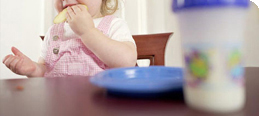Eating Guidelines for Toddlers

By Dr. Joey Shulman D.C., RNCP
With the intense energy demands of growing toddlers (age 1 to 3 years), it is essential to incorporate nutrient-rich foods into their diets. Fruits, vegetables, proteins, essential fats and whole grains are nutritional staples children should be consuming daily.
To broaden your toddlers nutritional horizon, it is best to incorporate several foods with different textures, tastes, smells and colors. Do not be discouraged if your child refuses a food initially; simply introduce the same food again at a later time. With continual persistence on behalf of the parent (8 to 10 exposures), children will develop an increased preference for that food.
Toddler tips for healthy eating
1. Do not rush your toddlers meal. Children need time to chew food thoroughly to optimize digestion.
2. To minimize the amount of white sugar your toddler consumes, dilute his or her fruit juice (i.e. ¾ water, ¼ juice). It is best to have your toddler eat fruit and drink water.
3. Always supervise your toddler while he or she eats. A choking toddler may not make noise.
4. To sneak more fruits and vegetables into your toddlers diet, puree vegetables and fruits and add them to sauces, yogurts, etc. (e.g. add pureed broccoli to spaghetti sauce).
5. Do not force a child who is not hungry to eat. By doing so, you are dissociating your toddler from his or her true hunger signal. Toddlers are the first to let you know when they would like to eat.
Foods that may cause choking in toddlers
Cherries with pits
Chunks of meat
Grapes
Hot dog pieces
Marshmallows
Peanut butter
Popcorn
Raisins
Raw carrots
Raw celery
Round or hard candy
www.truestarhealth.com
With the intense energy demands of growing toddlers (age 1 to 3 years), it is essential to incorporate nutrient-rich foods into their diets. Fruits, vegetables, proteins, essential fats and whole grains are nutritional staples children should be consuming daily.
To broaden your toddlers nutritional horizon, it is best to incorporate several foods with different textures, tastes, smells and colors. Do not be discouraged if your child refuses a food initially; simply introduce the same food again at a later time. With continual persistence on behalf of the parent (8 to 10 exposures), children will develop an increased preference for that food.
Toddler tips for healthy eating
1. Do not rush your toddlers meal. Children need time to chew food thoroughly to optimize digestion.
2. To minimize the amount of white sugar your toddler consumes, dilute his or her fruit juice (i.e. ¾ water, ¼ juice). It is best to have your toddler eat fruit and drink water.
3. Always supervise your toddler while he or she eats. A choking toddler may not make noise.
4. To sneak more fruits and vegetables into your toddlers diet, puree vegetables and fruits and add them to sauces, yogurts, etc. (e.g. add pureed broccoli to spaghetti sauce).
5. Do not force a child who is not hungry to eat. By doing so, you are dissociating your toddler from his or her true hunger signal. Toddlers are the first to let you know when they would like to eat.
Foods that may cause choking in toddlers
www.truestarhealth.com
MORE



